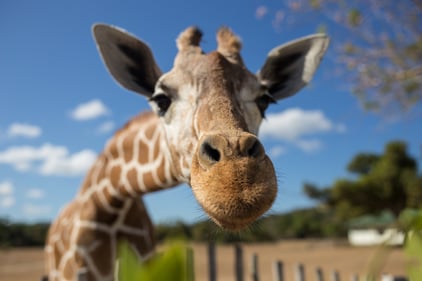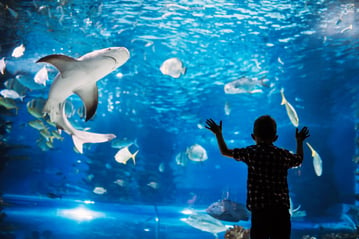10 Spectacular Virtual Field Trips for Autistic Students
Field trips create enriching experiences that support instruction. Students habitually love field trips, and they get excited about hands-on learning. Teachers love field trips because they engage students in learning, allow for real-life connections, support cultural education, and boost critical thinking.
Field trips are essential for autistic students. Autistic individuals often struggle with socialization, and new environments cause distress for some. Teaching strategies to prevent uncomfortable situations in the community is essential for autistic students. Field trips allow for particular teaching opportunities to help autistic students feel comfortable in different environments.
Parents may feel uncomfortable sending autistic children on in-person field trips. Virtual field trips can eliminate worry and safety concerns, and they also allow students to experience situations that they wouldn’t get to experience otherwise. Advances in technology will enable students to experience the community they live in and the world around them, and virtual field trips will let students explore places that they may not otherwise get to see. In addition, practicing on a virtual field trip can be great for preparing autistic students for going on a “real” field trip down the road.
Here are ten fun virtual field trip ideas that will benefit the learning of our neurodivergent students. A new teletherapy platform designed for autistic students -- the Stages Learning Line Digitial Education Platform -- now has many of the image-based language learning tools designed by STAGES® Learning incorporated into the platform. This makes it easy to use the cards virtually while taking a virtual field trip!
1. Let’s take a trip to the Zoo
 Going to the zoo is a favorite of mine. There are opportunities for learning throughout. For autistic students, the zoo offers a lot of great learning moments. It can enhance language development and communication skills. We can teach unknown animals and new vocabulary terms. You can focus on comprehension while virtually visiting the zoo, ask about habitats or sounds, or anything else relating to the animals they see. When you visit the zoo virtually, you get the added benefit of seeing the animals up close. You can ask your students to describe the features of a specific animal, notice the environment that the animal lives in, and so much more. Enrich your student’s virtual field trip to the zoo using Stages Learning Lang-O-Learn Animal Cards.
Going to the zoo is a favorite of mine. There are opportunities for learning throughout. For autistic students, the zoo offers a lot of great learning moments. It can enhance language development and communication skills. We can teach unknown animals and new vocabulary terms. You can focus on comprehension while virtually visiting the zoo, ask about habitats or sounds, or anything else relating to the animals they see. When you visit the zoo virtually, you get the added benefit of seeing the animals up close. You can ask your students to describe the features of a specific animal, notice the environment that the animal lives in, and so much more. Enrich your student’s virtual field trip to the zoo using Stages Learning Lang-O-Learn Animal Cards.
2. Let’s explore the museum
When we visit a museum, we take a step back in history. Visiting a museum offers many enriching experiences for our students. While on a virtual field trip to a museum, students can learn to make connections to artwork, historically significant events, and their own lives. Autistic students are often visual learners, and exploring artwork with their critical eye may offer a tremendous experience. The Metropolitan Museum of Art provides a great virtual field trip, and students can hop in a time machine and travel back to explore different artwork from specific periods, geography, and critical topics. A virtual visit to the museum will be a very delightful experience for your students.
- The Smithsonian National Museum
- The Louvre
- The Metropolitan Museum of Art
- Boston’s Children's Museum
3. Let’s take a journey undersea at the aquarium
 The aquarium is a fun field trip for all learners. Students will get the opportunity to learn about different sea creatures and underwater habitats, and they will learn to become environmentally conscious of the importance of keeping water clean. The virtual sea otter experience at the Shedd Aquarium seems to be educationally focused, plus sea otters look adorable. The Monterrey Bay Aquarium offers free webcams of its many sea creatures. Ripley’s Aquariums is my favorite for virtual experiences. They have their topics broken up by grade level, including lesson plans and activity pages. You can even join Ripley’s staff for an excellent Google Meet in which they will teach you about their fantastic sea creatures.
The aquarium is a fun field trip for all learners. Students will get the opportunity to learn about different sea creatures and underwater habitats, and they will learn to become environmentally conscious of the importance of keeping water clean. The virtual sea otter experience at the Shedd Aquarium seems to be educationally focused, plus sea otters look adorable. The Monterrey Bay Aquarium offers free webcams of its many sea creatures. Ripley’s Aquariums is my favorite for virtual experiences. They have their topics broken up by grade level, including lesson plans and activity pages. You can even join Ripley’s staff for an excellent Google Meet in which they will teach you about their fantastic sea creatures.
4. Let’s experience outer space
I’ve encountered some autistic students who are especially interested in space exploration. A virtual trip into space could be very motivational for some children. The study of space encompasses many different factors, including technology and math. A virtual field trip to NASA will allow for a wide variety of learning targets. The Nickelodeon slime experience would interest my students. Many of my neurodivergent kiddos enjoy the tactile response from slime. Seeing how slime responds in space would pique their curiosity, and they would enjoy seeing their favorite Nickelodeon actors react to the slime in the space experiment.
5. Let’s see Mickey and all his friends at Disney
 What child doesn’t love Disney and all that goes along with it? The rides, restaurants, characters, fireworks, and so much more encompasses a visit. Every child can find something enjoyable. That’s why a virtual field trip to Disney is such a great idea. You can tie many educational targets into your Disney virtual trip. Students can work on making choices, adding up snacks at concession stands, learning coping skills while listening to the virtual fireworks, learning new vocabulary, and practicing their communication skills. You can even use the experience as a reward for exceptional behavior.
What child doesn’t love Disney and all that goes along with it? The rides, restaurants, characters, fireworks, and so much more encompasses a visit. Every child can find something enjoyable. That’s why a virtual field trip to Disney is such a great idea. You can tie many educational targets into your Disney virtual trip. Students can work on making choices, adding up snacks at concession stands, learning coping skills while listening to the virtual fireworks, learning new vocabulary, and practicing their communication skills. You can even use the experience as a reward for exceptional behavior.
My favorite is Virtual Disney Field Trip, created by Megan Fadal
6. Let’s go and learn at the national parks
According to the Census Bureau, 80.7 percent of Americans live in an Urban community. Many of our students won’t have the opportunity to visit America’s most beautiful parks. A virtual field trip to a national park will open up their eyes to the beauty that could be experienced across our country. From volcanos, glaciers, or forests, students will be excited by the greatness of nature.
7. Let’s experience community helpers and where they work
 In special education classrooms, we often target identifying community helpers and describing their functions. A virtual trip to see where community helpers work will be beneficial in students mastering the concept of the importance of these individuals. Students will learn why community helpers are so essential and how to react appropriately to specific community helpers. For further instruction, use the Stages Learning Community Helper Puzzles or the Stages Learning Occupation Flash Cards.
In special education classrooms, we often target identifying community helpers and describing their functions. A virtual trip to see where community helpers work will be beneficial in students mastering the concept of the importance of these individuals. Students will learn why community helpers are so essential and how to react appropriately to specific community helpers. For further instruction, use the Stages Learning Community Helper Puzzles or the Stages Learning Occupation Flash Cards.
8. Let’s learn about history while traveling the world
Historically significant architecture is all around the world. Students can get an up-close view of the tremendous structures and discover their historical significance on a virtual field trip.
9. Let’s see the farmer and all his friends at the farm
After virtually visiting the farm with your class, you can have your students work on identifying and matching farm animals with the Stages Learning On the Farm Matching Game.
10. Let’s learn about music at these incredible places
 Music captivates many autistic individuals. Neurodivergent children often enjoy the structure of songs and the repetitive nature of specific tunes. Going on a virtual musical-themed field trip may be beneficial and could undoubtedly support language development for our students.
Music captivates many autistic individuals. Neurodivergent children often enjoy the structure of songs and the repetitive nature of specific tunes. Going on a virtual musical-themed field trip may be beneficial and could undoubtedly support language development for our students.
Field trips are a right of passage for students while at school. Kids learn through the exploration of different topics. A virtual field trip will support experiences that a student may not get to experience otherwise. Autistic students are no different from neurotypical children concerning enjoying field trips, and they should have the same opportunities to participate.
What virtual field trips above are you going to try with your class? Do you have any additional suggestions for virtual field trip places to go? I hope you enjoy them as much as I do.

Tatiana Tortora
Tatiana Tortora is a special education teacher in New York, specifically teaching students on the spectrum. She has her master’s degree in childhood education and students with disabilities. Tatiana is passionate about building understanding and acceptance of individuals with Autism.




